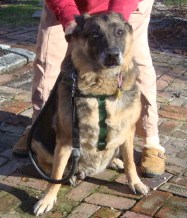PANNUS
 Pictured is Bridget an 11 year old German Shepherd from Point Pleasant, NJ in Ocean County, with Pannus.
Pictured is Bridget an 11 year old German Shepherd from Point Pleasant, NJ in Ocean County, with Pannus.
What is Pannus?
Pannus is technically known as chronic superficial keratitis. It is an inflammatory condition of the cornea of the eye in dogs that causes a red eye with a haze/film/inflammation on the cornea (keratitis), that tends to progress and worsen with time.
Pannus is most common in German Shepherd dogs, where it is thought to be an inherited condition that usually manifests itself between 3-5 years old. Usually both eyes are affected. Other breeds such as Greyhounds can also get pannus.
Besides breed, there may be a triggering link to ultraviolet sun light exposure and high altitudes, as it seems more common with these factors.
Cause and Progression of Pannus:
It is classified as an immune mediated disease, an autoimmune disease, where the body’s immune system goes awry and attacks it’s own cornea. It usually starts at the edges and the result is that small blood vessels, granules and connective tissue migrate across the cornea and accumulate in plaques of tissue that may be grey-pink, brown or become black. Often times the third eyelid becomes thickened and inflamed, as well as inflammation and conjunctivitis on the conjunctiva just above the eye. Oftentimes there is a mucous discharge associated with pannus. Pannus can affect vision and eventually lead to blindness if not treated.
Treatment of Pannus:
Treatment involves trying to locally suppress the immune system from continuing damage to the cornea and treating to decrease inflammation. Steroids such as prednisolone acetate or dexamethasone eye drops are commonly used. Other immunomodulating eye drops such as cyclosporine or tacrolimus, sometimes used in conjuction with steroids can give good control. The goal is to keep inflammation and keratitis at bay and quiet, to prevent worsening of lesions, and of course to preserve vision. Treatment is usually life long. Some dogs who do not let their owners put in eye drops can get steroid injections in the conjunctiva just above the eye monthly to help control pannus. Trying to avoid direct sunlight for long periods of time, especially when the sun is directly overhead may also help control the disease.
Just like their owners, our four legged friends need there eyes examined. Contact our office today to schedule your dogs next exam.
Squan Animal Hospital 1427 Lakewood Rd Manasquan, NJ 08736 Phone: 732-528-9199 Fax: 732-528-0769 E-Mail: cs@squananimalhospital.com

